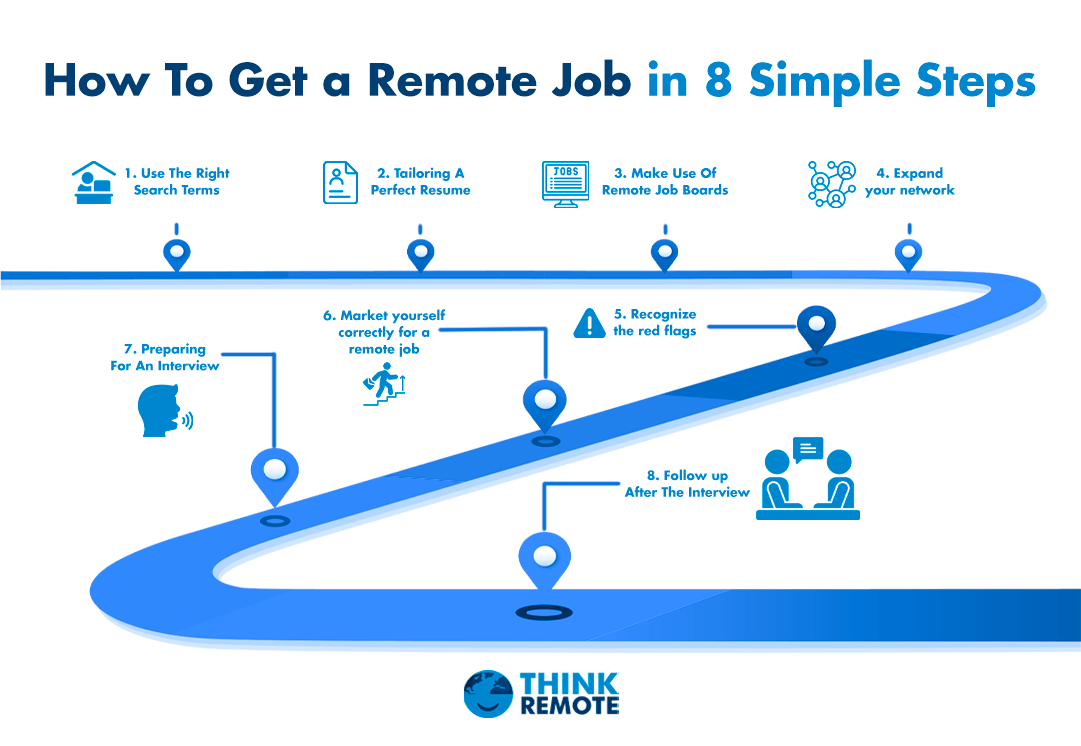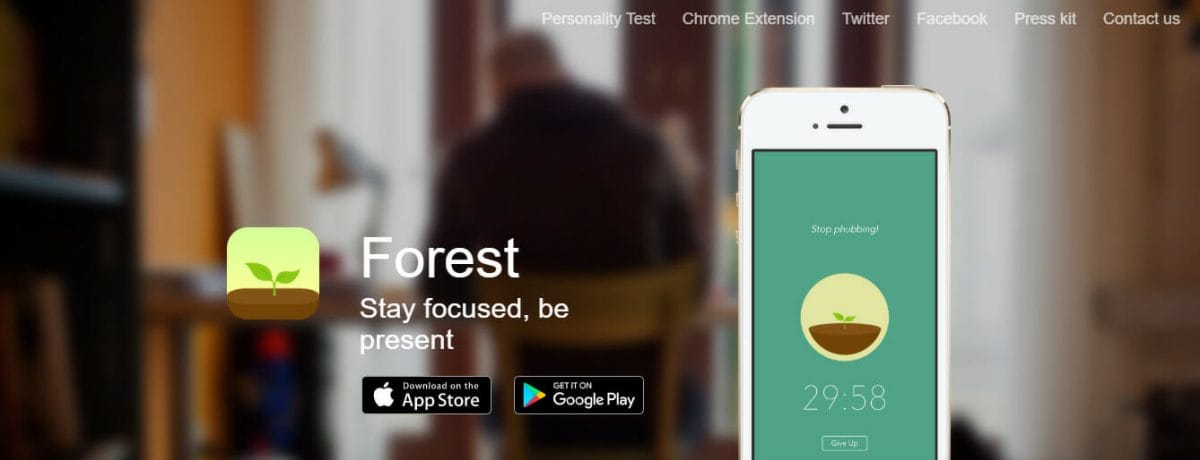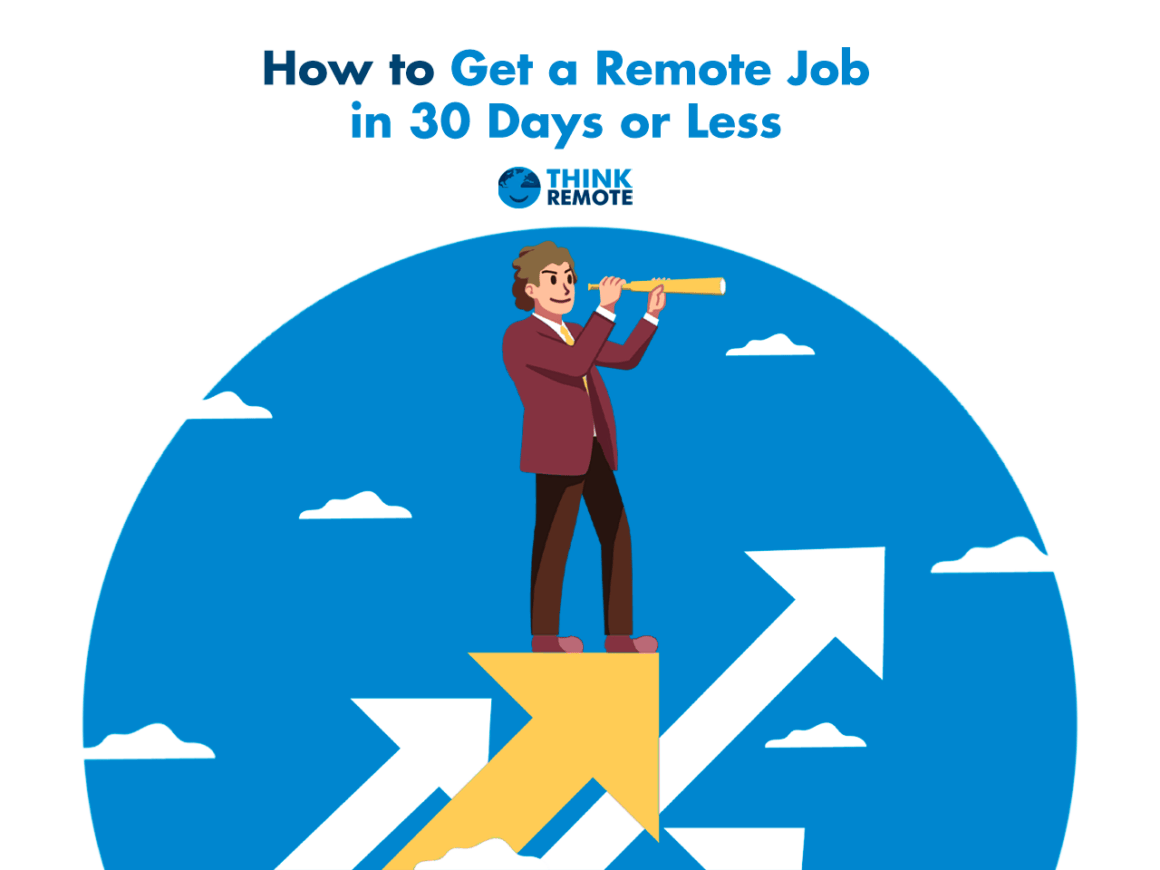Why Is Finding a Remote Job So Hard?
Did you know that remote work has grown by over 159% in the past decade? With the rise of technology and the transformation of the work culture, more and more companies are adopting flexible policies. But the question on every aspiring remote worker’s mind is: how to get a remote job?
While remote work offers numerous benefits, the competition for these positions keeps increasing. With the global talent pool at an all-time high and the barriers to entry lower than ever, job seekers from around the world are applying for remote jobs. This high level of competition can make finding the right remote job a daunting task.
In this article, we’ll give expert tips on how to successfully secure a remote position.
How To Get a Remote Job in 8 Simple Steps

1. Use The Right Search Terms
To have your pick of the remote jobs available, you first need to know how to look for them, as not all remote work is described as “remote.”
Employers may use several other keywords to indicate that a job is not office based. For your job search to be thorough, it’s important that you familiarize yourself with them first.
Here are some alternative terms that may be used to describe a remote position: Telework Employees are allowed to work away from the main office site using tools like the internet and project management software. Distance work Work that is done by employees from various locations. This may include working from different offices. Dispersed team Team members are spread out but not necessarily far away from each other. The work could be fully remote, based on different offices and coworking spaces, or fully remote. Distributed work Team members are not based in a central location but could be spread across office spaces, home offices, and coworking spaces. Remote OK/ remote-friendly The company is willing to accommodate remote workers, but the job can also be performed in-office. Free-range worker Another term for a remote worker. Telecommute Employees can work from a place other than the central office. Work from home Employees work remotely. From from anywhere Employees work remotely and the position is not restricted to a geographic location; the job can be done from anywhere in the world.
You’ll have noticed that some of these terms don’t all mean the same thing.
You’ll need to give the employer a sufficient reason to pick you over an in-office candidate by demonstrating strong remote work skills, such as time management and communication. You’ll also need to check whether the job must be done from a specific region.
Another thing to consider is whether the type of remote work advertised meets your expectations.
Sometimes a dispersed team might be based across several coworking spaces, which might not be what you want if you’re hoping to work from home.
Lastly, look out for terms that imply some level of in-office work, including:
- hybrid
- blended work week
2. Tailoring A Perfect Resume
Tailoring a resume for a remote job can be different from a traditional in-office job, as it may require you to have some additional qualifications.
Since remote work is becoming common, it’s important to make sure that your resume stands out and showcases your ability to work independently and effectively in a remote environment. It needs to build trust among your employers.
Here are some practical tips:
- First, highlight your relevant experience. If you’ve held remote jobs in the past, make sure to mention them and highlight the skills you developed while working remotely. This can include anything from time management to effective communication.
- Next, emphasize your adaptability and flexibility. Remote jobs often require employees to work in a changing environment and be able to adapt quickly. Mention any instances where you had to adapt to new or unfamiliar technologies or any experience you have with self-directed learning.
- Lastly, and maybe most important, Show your proficiency and experience working in a remote environment. Emphasize your ability to work independently, manage your own time, and stay productive while working remotely. If you have any examples of past projects you’ve completed while working remotely, be sure to mention them as well.
3. Make Use Of Remote Job Boards
Many of us tend to let our job searches gravitate toward large job networking sites, such as LinkedIn. While these can yield great results, you’ll find more diverse remote opportunities on job boards that cater specifically to remote workers, such as FlexJobs and JustRemote.
Narrow your search by checking out boards that focus on specific roles or industries. DistantJob is great for developers, while The Remote Nurse features work-from-home opportunities for medical professionals. Our remote job board also features jobs across different industries and career paths.
Here are other useful remote job boards:Type of Job Job Boards Available Writing Jobs Problogger
Smart Blogger Job Board
Media Bistro
BloggingProGraphic Designing Media Bistro
Dribbble
The Design Kids
We Work RemotelyUX/UI Designer IxDA jobs
UXjobsboard
Dribbble
KropDigital Marketer Remotive
Upwork
KropAccountant Accounting jobs today
American Accounting Association
Career BuilderHR Jobs HR Jobs
HR Crossing
ihirehrVideo Editor Upwork
FiverrIT DistantJob
Arc
Toptal
4. Expand your network
Building your network is an essential step in finding a remote job. While job boards and recruiting sites are great resources, word-of-mouth can often lead to even better opportunities. Reach out to your professional network, including former colleagues, friends, and acquaintances, and let them know you’re on the hunt for a remote job. Attend networking events, industry conferences, and webinars to connect with other professionals in your field.
Additionally, online remote work communities like Reddit’s r/digitalnomad or Slack’s Remotely One offer a great opportunity to network and discover new remote job opportunities. Don’t be afraid to put yourself out there and make connections – you never know where your next opportunity may come from!
5. Recognize the red flags
The online work community has become much more sophisticated over the past decade. Unfortunately, so have the scams.
Driven by the rising popularity of remote positions, the number of phony work-from-home job ads has shot up over recent years. Eagerness to get a remote job means that many applicants don’t register the warning signs when they encounter them.
Some common signs of a remote job scam include:
- Asking for an upfront investment from the candidate
- Requesting personal financial information (for example, your social security number)
- Obvious grammar or spelling mistakes
- The employer uses a personal email address or one that mimics a well-known brand
- Asking you to pay for training
- Commission is based on how many people you recruit
When vetting job posts, always trust your gut. Keep your distance if an opportunity seems too good to be true or an employer is eager to hire you without seeing your resume first.
6. Market yourself correctly for a remote job
Knowing how to make a resume that showcases your remote work skills is key to the success of your job hunt.
As a remote candidate, you must demonstrate the right skills to do the job well and show that the employer can trust you to work independently.
Demonstrate these qualities by tailoring your resume to the job you are applying for. Scour the job description for skills the employer is looking for (and you offer) and pepper them into your objective, skills, and work experience sections.
Previous experience working remotely is a valuable plus, but don’t worry if you haven’t previously held a fully remote position. Experience freelancing, working across regions, or in hybrid positions can all underline your ability to work efficiently away from a physical office space.
What Skills Are Fundamental For Remote Workers?
- Ability to work independently: Remote work involves working across different time zones. This means that your colleagues will not be able to help you at all times. You’d have to wait till their work day begins. But if you’ve the ability to work independently, you can carry out your tasks efficiently.
- Strong Communication Skills: Communication is the key to a successful career. But in a remote work environment, this is more pronounced. Lack of message clarity can cause miscommunication and frustration among your team members.
- Comfortable with digital tools: Remote work means working with the latest technology. As an aspiring remote worker, you should be able to carry out tasks on the computer using the latest apps. In other words, you should have a thirst to learn.
- Appreciation for cultures: A remote work atmosphere involves working with people across the globe. Your home country’s culture can be diametrically opposite from your colleagues. This means you need a general appreciation for all cultures.
Team player mindset: Most work involves collaboration. While you should be able to work independently, you should also be in a position to entertain new ideas and work with them.
7. Preparing For An Interview
Preparing for an interview for a remote job can be a bit different than preparing for an in-person interview. Here are a few tips to help you prepare for a remote job interview:
- Get familiar with the company’s communication tools: Many remote jobs rely heavily on communication tools like Slack, Zoom, and Google Meet. Make sure you know how to use these tools and are comfortable navigating them. This will show the interviewer that you’re ready to hit the ground running.
- Highlight your experience working in a remote environment: During the interview, be sure to mention any previous remote jobs you’ve held and the skills you developed while working remotely. Mention the strategies you’ve used to stay productive, communicate effectively, and overcome your challenges.
- Showcase your flexibility: Remote jobs often require employees to work in a dynamic environment and be able to adapt to changes quickly. During the interview, mention any instances where you’ve had to adapt to new or unfamiliar technologies or any experience you have with self-directed learning.
- Dress the part: Even though it’s a remote interview, you still want to present yourself professionally. Dress in business attire, have a clean and organized background and be mindful of the lighting and your posture.
- Be prepared for a tech check: Remote interviews are prone to technical issues, such as internet connection or software malfunctions. Be prepared for these issues and have a backup plan; this way, you will appear organized and reliable to the interviewer.
How To Negotiate Your Salary?
Negotiating your salary for a remote job can be a tricky process. Unlike traditional office positions, remote work can offer unique benefits that you may want to take into account when discussing your compensation package. Here are some expert tips on how to negotiate your salary for your remote job:
- Research the average salary for your position and industry.
- Consider the cost of living in the area where the company is based.
- Take into account the value of the benefits and perks offered.
- Highlight any relevant skills or experience that make you a strong candidate.
- Be confident and assertive in your negotiation while also being open to compromise.
8. Follow up After The Interview
Following up after an online interview can be an effective way to express your interest in the job and set yourself apart from other candidates. But how do you do it in an intriguing way that makes an impact? Here are a few tips to help you follow up in a way that stands out:
- Send a thank-you note: A thank-you note is a great way to show your appreciation for the interviewer’s time, and it also serves as an opportunity to reiterate your qualifications. Instead of a plain email, use a video or an audio message to thank them, it will be more memorable and personal.
- Connect on LinkedIn: After the interview, connect with the interviewer on LinkedIn. This will not only keep you on their radar, but it will also give them a better sense of your professional background and qualifications. Be sure to personalize your connection request and mention a specific point of the interview.
- Share something of value: After the interview, if you come across a relevant news article, blog post or some useful information that relates to the company or the position, send it to the interviewer. It shows that you have an interest and you’re keeping an eye on things that can benefit the company.
- Be persistent but not pushy: After the interview, if you haven’t heard back from the interviewer in a few days, it’s okay to send a follow-up email. But be sure to keep it polite and professional. Ask about the status of the hiring process and reiterate your interest in the position, but don’t be overly pushy or demanding.
Here are some practical templates you can also use:
Email template #1
Subject: Thank You for the Interview
Dear [Interviewer’s Name],
I wanted to take a moment to thank you for the opportunity to interview for the [Position] role at [Company]. It was a pleasure to learn more about the company and the team, and I am excited about the prospect of working with you.
I remain confident in my ability to contribute to the success of the company, and I look forward to hearing back from you regarding next steps. If you need any further information from me, please let me know.
Thank you again for your time and consideration.
Best regards,
[Your Name]
Email template #2
Subject: Following Up on the [Position] Role
Dear [Interviewer’s Name],
I hope this email finds you well. I wanted to follow up on the status of the [Position] role at [Company]. I remain very interested in the opportunity to work with the company and would appreciate any updates you could provide.
Please let me know if there is anything further I can provide to support my candidacy. I appreciate your time and consideration and look forward to hearing back from you soon.
Best regards,
[Your Name]
Tips For Remote Work Newbies

1. Self Organization
Having a remote job means taking autonomy to organize your tasks to deliver on time. You won’t have your manager physically around you all the time.
2. Teamwork
Working remotely involves collaborating with people from across the globe. You should be able to schedule meetings, communicate and work with everyone cutting across time zones. Your ability to work over virtual communication and collaboration tools can catapult your career.
3. Stay Visible
Your colleagues cannot look at you working all the time. Most of your work happens behind the scenes. In such cases, make sure you use your communication tools effectively. For example, if you’re a graphic designer, make sure you talk about your ongoing projects during meetings and deliver your designs on time.
4. Choose A Workplace That Stimulates Creativity
Your work environment can decide your creativity. The best part about working remotely is that you can work from anywhere. Moving into calmer locations or working in coffee shops with pleasant music playing in the background can allow you to work efficiently.
You can also choose to be a digital nomad and go to locations that are calm. If you’re a beach person, choosing an Airbnb or a beach shack as a place of work can be a good idea. Alternatively, if you’re a mountain person, an Airbnb that overlooks a valley seems to be a perfect option for you.
5. Decorate Your Home Office
A home office is a must if you’re working from home. A separate physical place within your house can help you maintain a work-life balance. Decorating your workspace can enhance creativity and productivity.
Here are a few ways you can do it:
- Choose a wall color that suits your taste | Buy wallpapers
- Put up motivational posters | Buy now
- Get a comfortable chair that can help maintain a good posture | Buy now
- Pay attention to the lighting of the room. Make sure it is well-lit | Buy lights
5 Apps For Remote Workers
1. Evernote

With Evernote, you can create notes, to-do lists, and reminders and easily access them from any device. It’s a versatile note-making app that allows you to stay organized and efficient.
The app also allows you to capture ideas on the go with audio and photo notes and save web pages for later reading.
It also has collaborative features that allow team members to share notes and work together on projects in real-time.
Available on App Store and Google Play.
Rating:
- Android: 4.1/5
- Apple: 4.4/5
2. Notion

Notion is a powerful all-in-one workspace that lets you manage multiple projects and workflows. With Notion, you can create custom pages for different projects and tasks and easily organize them with drag-and-drop functionality.
Available on App Store and Google Play
Rating:
- Android: 3.8/5
- Apple: 4/5
3. Calm

Calm is a meditation and mindfulness app that’s perfect to manage stress and improve focus. You get access to guided meditations, sleep stories, and breathing exercises, all designed to help you relax and stay centered.
It also offers a variety of programs, including daily meditations, to help you establish a consistent meditation practice.
Available on App Store and Google Play.
Rating:
- Android: 4.4/5
- Apple: 4.8/5
4. Forest

Forest is an app that helps you stay focused and reduce distractions by gamifying your productivity.
When you need to focus, you plant a virtual tree in the app, and it grows while you work. If you leave the app before the tree is fully grown, it dies.
The app also features a social aspect, so you can compete with friends and colleagues to see who can grow the most trees.
Available on App store and Google Play.
Rating:
- Android: 4.7/5
- Apple: 4.8/5
5. Flipd

Apart from Forest, Flipd also lets you disconnect from your phone. It lets you focus on your work by locking your phone for the time period that you set. You’ll have no notifications, with messages and phone calls being silenced.
The app also features a range of productivity tools like goal setting and time tracking, so you can stay on top of your work while minimizing distractions.
Available on App store and Google Play.
Rating:
- Android: 3.1/5
- Apple: 4.5/5
Ready to Start Working From Home?
Even in 2023, remote work opportunities can seem elusive. But even if you’re not sure how to get a remote job, learning the right tools and strategies can help you optimize your search and give you a competitive edge over other job seekers.
It’s important to stay organized throughout the process. Keeping track of all the jobs you apply for and the companies you contact. This will help you stay focused and on track so you don’t get overwhelmed or discouraged.
Ultimately, it takes time and effort to land remote work that suits your skills and experience. But with perseverance and a positive attitude, you can find remote work that is a good fit for you and your career goals.






